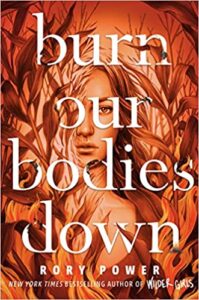A note from the editor:
We are midway through October and Monster Librarian still needs to raise the funds to pay for our hosting fees and postage in 2021. If you like what we’re doing, please take a moment to click on that red “Contribute” button in the sidebar to the right, to help us keep going! Even five dollars will get us closer to the $195 we need to keep going at the most basic level. We have never accepted paid advertising so you can be guaranteed that our reviews are objective. We’ve been reviewing and supporting the horror community for 15 years now, help us make it another year! Thank you! And now our review of Horrid by Katrina Leno.
Horrid by Katrina Leno ( Bookshop.org | Amazon.com )
Little, Brown Books for Young Readers, 2020
ISBN-13 : 978-0316537247
Available: Hardcover, Kindle edition
There was a little girl
Who had a little curl
Right in the middle of her forehead.
And when she was good,
She was very, very, good,
And when she was bad, she was horrid!
The title of Horrid comes from a nursery rhyme that started out as a poem by Henry Wadsworth Longfellow, and there’s definitely some foreshadowing going on. After her father dies, Jane and her mother reluctantly move to the home where her mother grew up, North Manor, in Bells Hollows, Maine. Empty since her grandmother died, North Manor has an abandoned air. Its windows are broken and it is in disrepair, with bad wiring, creaky floors, and a local reputation as the “creep house”. Surprisingly, although it is September, roses are in full bloom.
Jane’s mother won’t explain why she never brought Jane there before, and as the two of them clean up, move in, and begin to move forward, strange and unexplained things start happening in the house and garden. Jane starts school, makes friends, and gets a job working in a bookstore, while her mom sorts and cleans and starts a new job with long hours. Wariness and even hostility from longtime residents of the community when they hear Jane is living in North Manor makes Jane suspect something terrible happened there that caused her mother to leave. Strange things keep happening: Jane discovers she’s lost time, with no memory of text messages she’s sent or things she’s done; she is certain someone is in the house, but no trace can be found; she has sudden bursts of violent temper. As she and her mother try to cope with their grief and loss, Jane becomes more and more disoriented, especially once she learns the town, and her mother, have been keeping her in the dark about a twisted family secret.
Very early in the book, we learn that Jane has pica (a psychological disorder that causes people to eat non-nutritive items and is associated with OCD and schizophrenia). Eating pages from books helps her manage her anger. As the story progresses, it’s difficult to tell if Jane is in a dissociative fugue and expressing extreme anger due to mental illness aggravated by grief and stress, especially after her mother takes her book away, or if she’s being possessed and/or haunted. I’m not familiar enough with pica to know if Leno’s representation is accurate, but her writing is evocative. It turns out that Jane is not the only person in her family to have had pica, or what effect it had on the past actions of other family members.
Leno does a great job of portraying the messiness and ugliness of grief and its effects on the book’s characters. Despite recognizing many of the elements of Gothic horror, I did not expect the ending, which left me shocked and breathless. Recommended.







Follow Us!